Study Reveals Alarming Link Between Air Pollution and Cancer Risk in Urban Communities
A recent study by the Desert Research Institute and the University of Nevada, Reno, reveals alarming links between air pollution and cancer risk in urban areas, particularly affecting low-income and minority communities. Published in Environmental Science & Technology, the research highlights significant health disparities and calls for urgent public health interventions to improve air quality and protect vulnerable populations.
UCLA Study Reveals Cancer Risks from Fire Smoke Chemicals
A groundbreaking study from UCLA reveals the cancer risks associated with polycyclic aromatic hydrocarbons (PAHs) found in fire smoke. Led by firefighter Derek Urwin, the research indicates that certain lesser-known PAHs may pose a greater cancer risk than the known carcinogen benzo[a]pyrene. Utilizing advanced simulations, the study highlights the need for improved safety measures for firefighters and others exposed to these hazardous chemicals.
Farmers Urged to Participate in Bluetongue Survey Amid High-Risk Warning
Learn about the Bluetongue survey initiated by the James Hutton Institute in response to a high-risk warning from the government. Help contribute to valuable insights on mitigating the impacts of the virus by completing a brief 10-minute survey. Stay informed on the recent disease recordings and take necessary precautions to protect livestock and livelihoods.
Study Finds Potential Link Between Tattoos and Increased Risk of Cancer
A recent study published in The Lancet reveals a 21% higher risk of malignant lymphoma in individuals with tattoos. The study links tattoo ink containing carcinogenic substances to potential health risks, highlighting the importance of monitoring ingredients in tattoo ink. Further research is needed to establish causality, but the findings raise concerns about the long-term health implications of getting tattoos.
Impact of Hot Weather on Older Individuals with Multiple Chronic Diseases
A new study by Griffith University reveals that older individuals with multiple chronic diseases are at an increased risk of hospitalization during hot weather. Dr. Zhiwei Xu emphasizes the need to consider these individuals as a distinct heat-vulnerable group in future heat early warning systems. With global temperatures rising, hospitals are expected to see a surge in patients with multimorbidity. Comprehensive medical management is crucial for these patients, who require more extensive care compared to those with a single chronic disease.
Study Reveals Link Between Socio-Economic Status and Genetic Predisposition to Cancer and Other Diseases
A recent study from the University of Helsinki in Finland reveals the correlation between socio-economic status and genetic predisposition to diseases like cancer. Individuals with higher SES have a greater genetic risk of breast and prostate cancer, while those with lower SES are more susceptible to conditions like diabetes and lung cancer. These findings could lead to more tailored screening protocols for diseases, enhancing detection and prevention strategies.
Study Shows Living Near Greenery and Low Crime Rates May Reduce Dementia Risk Factors
A recent study led by Monash University suggests that living in areas with abundant greenery and low crime rates may reduce dementia risk factors. Proximity to greenspace and lower crime rates were associated with fewer modifiable dementia risk factors, particularly in individuals residing in areas with lower socioeconomic status. The study emphasizes the importance of key modifiable dementia risk factors such as high blood pressure, obesity, high cholesterol, and physical inactivity, with proximity to greenspace identified as a significant factor promoting physical activity and social interaction.
Excessive Outdoor Night Lights Linked to Increased Stroke Risk, Study Finds
A new study suggests that excessive exposure to bright outdoor lights at night could increase the risk of stroke. Research involving over 28,000 individuals in a large city in China revealed a 43% higher risk of developing cerebrovascular disease for those with the highest levels of artificial outdoor light exposure at night. The study underscores the need for further research and public awareness regarding the potential health implications of light pollution.








